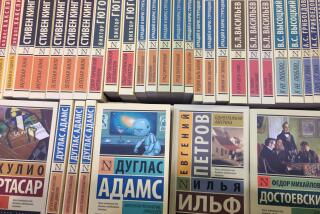Getty Scholar Walks Tightrope That Is <i> Glasnost</i>
For 20 years the invitations came--from France, Germany, Scandinavia and Britain. But it wasn’t until glasnost burst into full bloom that Aron Gurevich could accept a foreign invitation and leave his home in Moscow. Last year, on his first trip outside the Soviet Union, he visited Italy, and now the 64-year-old cultural historian is in Santa Monica. He is the first Soviet citizen to participate in the visiting scholar program at the Getty Center for the History of Art and the Humanities.
Ensconced in a sixth-floor office and equipped with a desktop computer that he pats on the head and fondly calls “this gentleman,” Gurevich is writing a book on 20th-Century French historical scholarship on the Middle Ages. “Do you know, I have a secretary who gets me everything I need,” he said, waving in the direction of well-filled bookshelves and marveling at the availability of literary resources in Southern California. As for the word processor, the first he has ever used, “It’s a revolution for me.”
Gurevich, who arrived in November and will stay through June, has been too engrossed in his work to indulge in much sightseeing. He shies away from easy comparisons between American and Soviet cultures, saying his view of the United States is too limited, but offers insight into the experiences of Soviet intellectuals.
A graduate of Moscow University, he has held important academic posts and is the author of nine books, including the soon-to-be-published “Medieval World: the Culture of the Silent Majority.” But Gurevich has also suffered for failing to follow a Marxist line, for being a revisionist and “for reading too much Western history.”
“I don’t complain; it’s a typical example. Many of us were persecuted with regard to our politics,” he said. But a climate of censorship has created a complex role for Soviet artists and intellectuals and caused them to be more involved in politics than many of their Western counterparts, Gurevich said.
When a repressive government cuts off sources of intellectual stimulation as well as livelihood, some scholars “compromise and sell themselves. They write not what they think but what is demanded. It’s the same in art, literature, cinema and music. During Stalin’s rule, everyone who was not in the mainstream, who had any originality had trouble,” he said.
“Now we have a leader who has brought important changes. I don’t idolize him, but we have a great possibility to express ourselves and to have scholars in the West review our position. It’s a great phenomenon.”
The change is exhilarating, but Soviet scholars who have emerged from the underground face serious challenges from “a chauvinistic movement” that favors a nationalistic state, he said. Chauvinists often “behave conservatively for materialistic reasons. Mediocre writers had great success under (Soviet leader Leonid) Brezhnev, but now nobody wants to publish them.”
Manuscripts that were once passed surreptitiously from scholar to scholar are now appearing in literary journals, along with new writings that would have been suppressed a few years ago. This is a bonanza for thinkers such as Gurevich, but “many people who were educated in the old notions can’t adjust to new ideas,” he said.
Others, too fearful to participate, have “decided to wait and watch the game and then side with the victors,” he said. “I can understand this, but if intellectuals are not involved today, they shouldn’t be tomorrow when food is on the table.”
Aware of frustration over perestroika’s failure to improve the Soviet standard of living, Gurevich said the new permissiveness cannot be taken for granted. “In 1964, Khrushchev was expelled in a few hours. Conditions did not return to Stalinism in full blossom, but development stopped.”
Gurevich said he has followed press reports of recent Soviet elections and is gratified that “new voices will be heard.” But “learning about democracy is a slow and difficult process,” and experience has left him skeptical. “We are in the middle of a crisis. But we must do as much as possible and behave as if we are absolutely sure that a return (to repression) is impossible.”
More to Read
Sign up for our Book Club newsletter
Get the latest news, events and more from the Los Angeles Times Book Club, and help us get L.A. reading and talking.
You may occasionally receive promotional content from the Los Angeles Times.






